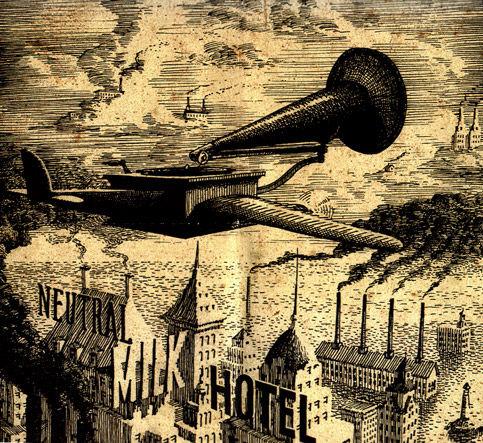Neutral Milk Hotel broke the silence last year on a decade-and-a-half long hiatus that began after their sophomore release, “In the Aeroplane Over the Sea.” The album, released in 1998, has since grown beyond an underground cult hit, and is adored for its melody, psychedelic quirks, and surreal, historically-inspired lyrics.
“In the Aeroplane Over the Sea” is worth revisiting in light of the band touring again, as well as being set to play at the Boston Calling music festival in September. Those who missed the album on the first go-through can rediscover this indie gem that influenced the likes of The Decemberists, Bright Eyes, and Bon Iver.
The opener, “King of Carrot Flowers Pt 1,” is a primer on the band’s stripped down, lo-fi folk aesthetic. An accordion is sometimes heard. Oddball sonic choices on IAOS include a whistling ghost, cosmic gurgling, and metallic screeching.
The bittersweet title track of “In the Aeroplane Over the Sea” typifies the album-wide commonality of simple but highly memorable sung melodies. “But for now we are young, let us lay in the sun, and count every beautiful thing we can see.”
In a 1997 interview with the now defunct Puncture magazine, Neutral Milk Hotel vocalist, guitarist, and song-writer Jeff Mangum described reading the diary of Anne Frank as a significant emotional experience, stating that he was influenced by her narrative while writing IAOS.
“Anna’s ghost all around. Hear her voice as it’s rolling and ringing through me.”
At over 8 minutes, “Oh Comely” is a journey; it sways between sorrow and hope, somber folk, and Seattle drone. It features only Mangum’s singing and playing, albeit for the additional horns in the last two minutes that evoke the finality of a funeral march. Jeff Mangum’s voice is at the nasally end of the spectrum, but his delivery is both earnest and honest.
“Holland 1945” has grim lyrics like “But now we must pick up every piece of the life we used to love just to keep ourselves…at least enough to carry on,” that contrast against fast-power chords and crackling fuzz. A festive tone is insistent here and in “Ghost,” as well as the punkish “King of Carrot Flowers pt 2-3.”
At the front of the album, “Two-headed Boy Pt 1” tells the story of a “Two-headed boy all floating in glass, the sun it has passed now it’s blacker than black, I can hear as you tap on your jar,” that ultimately lightens in tone for the strong album closer that is the song’s second half, “…Pt 2.” The chorus of the former is like a friend saying goodbye.
“In the Aeroplane Over the Sea” is enjoyable and timeless, first and foremost, because of the melodies, mostly sung by Jeff Mangum, but also played by a small orchestra’s worth of brass instruments dispersed throughout album. IAOS is also an interesting example of contorting the traditional folk song structure into more progressive shapes. The lyrics as successions of hullacinatory images are worth mulling over. What conversation do they have with the Anne Frank diary?
Most relevantly, “In the Aeroplane Over the Sea” is very much a “summer album.” Despite the tragic inspiration underlying it, the music never ceases to glow with charm, and it possesses a warmth that is best enjoyed when the breeze is the same temperature.

